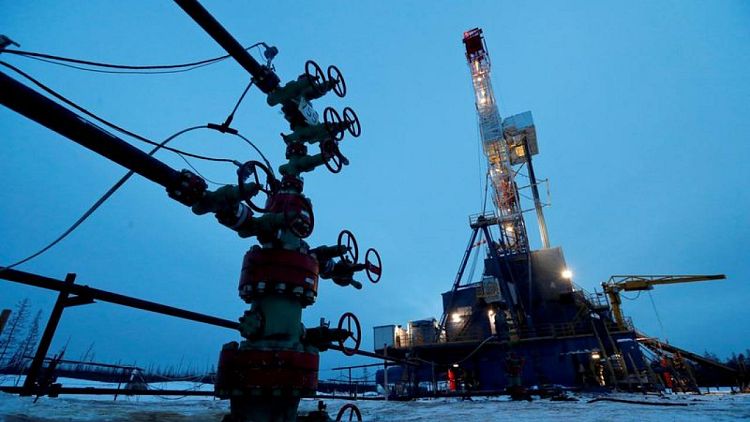By Devika Krishna Kumar
NEW YORK -Oil prices rose more than 5% on Monday, as a weaker dollar and strong global equities markets boosted crude futures after seven sessions of declines.
Brent crude climbed $3.57, or 5.5%, to end the session at $68.75 a barrel after touching its lowest since May 21 at $64.60 during the session.
U.S. West Texas Intermediate (WTI) crude for October delivery rose $3.50, or 5.6%, to settle at $65.64.
Both benchmarks marked their biggest week of losses in more than nine months last week, with Brent sliding about 8% and WTI about 9%.
But a drop in the U.S. dollar provided a boost on Monday, making crude less expensive for holders of other currencies.
"Although the oil complex has generally been able to shrug off strength in the stock market, the bullish combo of increased risk appetite and significant weakening in the U.S. dollar indices represents a potent mix that oil has been forced to recognize" said Jim Ritterbusch, president of Ritterbusch and Associates in Galena, Illinois.
The dollar index, which measures the currency against six peers, was down 0.4% after hitting its highest level in more than nine months on Friday.
The MSCI world equity index, which tracks shares in 50 countries, was up, after having its biggest weekly fall since June last week.
Still, many nations are responding to the rising coronavirus infection rate by introducing new travel restrictions.
"We expect to see more adjustments this week, but the market sentiment will likely remain bearish, with growing concerns over slower fuel demand worldwide," said Kazuhiko Saito, chief analyst at Fujitomi Securities.
China, the world's largest oil importer, has imposed new restrictions, which is affecting shipping and global supply chains. The United States and China have also imposed restrictions on flight capacity.
While the pandemic drags on fuel demand, supply is steadily increasing. U.S. production rose and drilling companies added rigs for the third week in a row, services company Baker Hughes said.
"We anticipate that benchmark oil prices will remain, for now, stuck in a period of trendless rangebound volatility," RBC Capital Markets analysts said in a note.
"Market participants may be compelled to buy the dip, but risk is not being forced and conviction levels remain low given the lack of visibility to near-term upside catalysts"
Investors were also adjusting their positions before the U.S. Federal Reserve's annual Jackson Hole symposium in Wyoming on Friday.
"While the virus remains a threat to the short-term demand outlook, despite signs of an improving situation in China, this week’s Jackson Hole summit may give the market some ideas about the timing of tapering," said Ole Hansen, Saxo Bank’s head of commodity strategy, referring to an expected reduction in monetary stimulus for the economy.



